On Monday 3 January, Special Assignment
Executive Producer, Johann Abrahams
visited the Mamre community as part of an investigation into the conflict between community and the municipality over land.
|
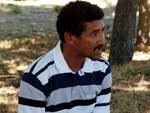 |
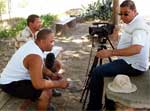 |
| Mamre_B103_005a |
Mamre_B103_006a |
| |
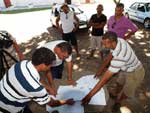 |
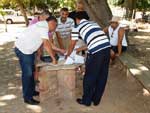 |
| Mamre_B103_008 |
Mamre_B103_009 |
| |
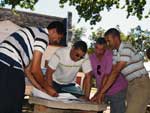 |
|
| Mamre_B103_010 |
|
| |
|
Certain members of the community, direct descendants of the Khoikhoi Khutsuqua tribe who lived in the Groenekloof valley long before the arrival of Dutch settlers at the Cape, are trying to preserve the land for their children.
They fear that the land will be lost forever if the municipality takes control over what they call traditional land.
A spokesperson for the group, Crown Prince David Johannes is a direct descendant of Benigna, the sister of Khoikhoi leader Hans Klapmuts, who lived in a kraal not far from present day Mamre.
Benigna, whose original name was Rosetta, worked on the farm Vissershok owned by Dutch farmer, Johannes Laubscher. She became his common law wife and bore him four children. When the farmer took a Dutch wife he asked Benigna to leave the farm with their children. He gave her some cattle and allowed her to use his name as a surname.
She went back to her people at the kraal at Louwskloof and later joined others on the Moravian mission station in Mamre, which started in 1808. She and the children were babtised by the missionaries. Today many of her descendants are still found in Mamre.
The group is taking the municipality and Dept of Land Affairs to court over the land using their First Nation status as a basis of their fight to retain control over Mamre.
South Africa is a signatory to the United Nations resolutions that seek to protect indigenous peoples and their land.
|
|